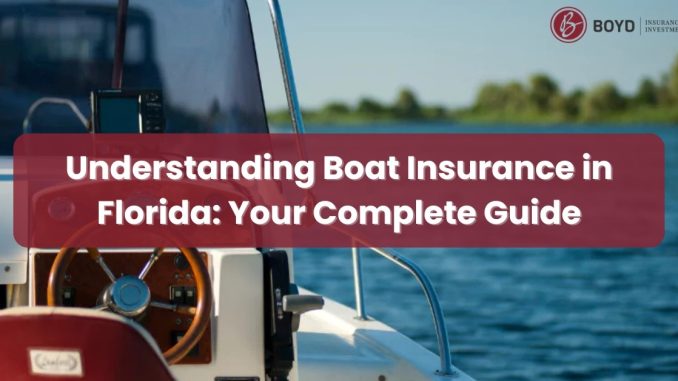
Owning a boat is a rewarding experience that blends adventure, relaxation, and a sense of freedom. Whether it’s a sleek motorboat, a sailboat, or a luxury yacht, the investment goes beyond the financial—it becomes part of your lifestyle. But with that ownership comes responsibility, and one of the most important steps in protecting your vessel and your peace of mind is securing the right insurance. Insuring your boat is not just about complying with marina requirements or lender conditions; it’s about ensuring that you’re prepared for the unexpected, from accidents and weather damage to liability claims and theft.
Boat insurance operates differently from auto or homeowners insurance, and understanding those nuances is key to making informed decisions. The first consideration is the type of coverage you need. Most boat insurance policies include physical damage coverage, which protects the hull, motor, and attached equipment against risks like collision, fire, vandalism, and severe weather. This coverage can be structured as actual cash value or agreed value. Actual cash value takes depreciation into account, meaning you’ll receive less for older equipment. Agreed value, on the other hand, pays a predetermined amount regardless of depreciation, which can be especially beneficial for high-end or custom vessels. Choosing between these options depends on your budget, the age of your boat, and how you plan to use it.
Liability coverage is another essential component. Boating accidents can result in injuries, property damage, or environmental harm, and liability insurance helps cover legal fees, medical costs, and settlements if you’re found responsible. For example, if your boat collides with another vessel or damages a dock, liability coverage ensures that you’re not personally on the hook for the expenses. It also protects you if a passenger is injured while onboard. Some policies offer additional protection for towing, salvage, and wreck removal, which can be costly and complicated without insurance support. These scenarios may seem remote, but they’re not uncommon, and having coverage in place allows you to navigate them with confidence.
Personal property coverage is also worth considering, especially if you keep valuable items on your boat. Electronics, fishing gear, water sports equipment, and personal belongings can be damaged or stolen, and this coverage helps reimburse you for those losses. It’s important to review the limits and exclusions carefully, as some policies may cap payouts or exclude certain items. If you frequently entertain guests or use your boat for extended trips, this coverage becomes even more relevant. Documenting your belongings with photos and receipts can streamline the claims process and ensure that you’re adequately compensated.
Uninsured and underinsured boater coverage is another layer of protection that’s often overlooked. If you’re involved in an accident with a boater who lacks sufficient insurance, this coverage helps pay for your medical expenses and damages. It’s similar to uninsured motorist coverage in auto insurance and is particularly valuable in areas where boating regulations are lax or enforcement is inconsistent. While you can’t control other boaters’ decisions, you can protect yourself from the consequences of their negligence.
Navigating the insurance market requires more than just comparing premiums. Working with an agent who specializes in marine insurance can help you tailor a policy to your specific needs. They’ll consider factors like the type of boat, its value, where it’s stored, and how often it’s used. For instance, a boat kept in a hurricane-prone region may require additional storm coverage, while a vessel used for charter or commercial purposes will need a different policy altogether. Transparency is key—disclosing how and where you use your boat ensures that your coverage is valid and comprehensive.
Maintenance and safety practices also play a role in your insurance profile. Insurers may offer discounts for completing boating safety courses, installing anti-theft devices, or using approved storage facilities. These measures not only reduce your risk but demonstrate responsible ownership, which can lead to more favorable terms. Regular inspections, proper documentation, and adherence to local regulations all contribute to a stronger insurance application and smoother claims experience.
Claims handling is another important consideration. In the event of an incident, you’ll want an insurer that responds promptly and fairly. Understanding the claims process, including what documentation is required and how long it typically takes, can help you prepare and avoid frustration. Some insurers offer mobile apps or online portals to simplify reporting and tracking, while others provide dedicated marine claims teams with specialized expertise. Choosing a provider with a reputation for customer service and responsiveness can make a significant difference when you need support the most.
Ultimately, insuring your boat is about more than protecting a physical asset—it’s about preserving your ability to enjoy the water without worry. It’s about ensuring that a mishap doesn’t turn into a financial crisis or a legal headache. By investing in comprehensive coverage and working with knowledgeable professionals, you can safeguard your vessel, your passengers, and your lifestyle. Whether you’re cruising along the coast, fishing in quiet coves, or hosting friends for a sunset sail, insurance provides the foundation for peace of mind and uninterrupted enjoyment. In a world where the unexpected can happen at any moment, being prepared is the most responsible course you can chart.